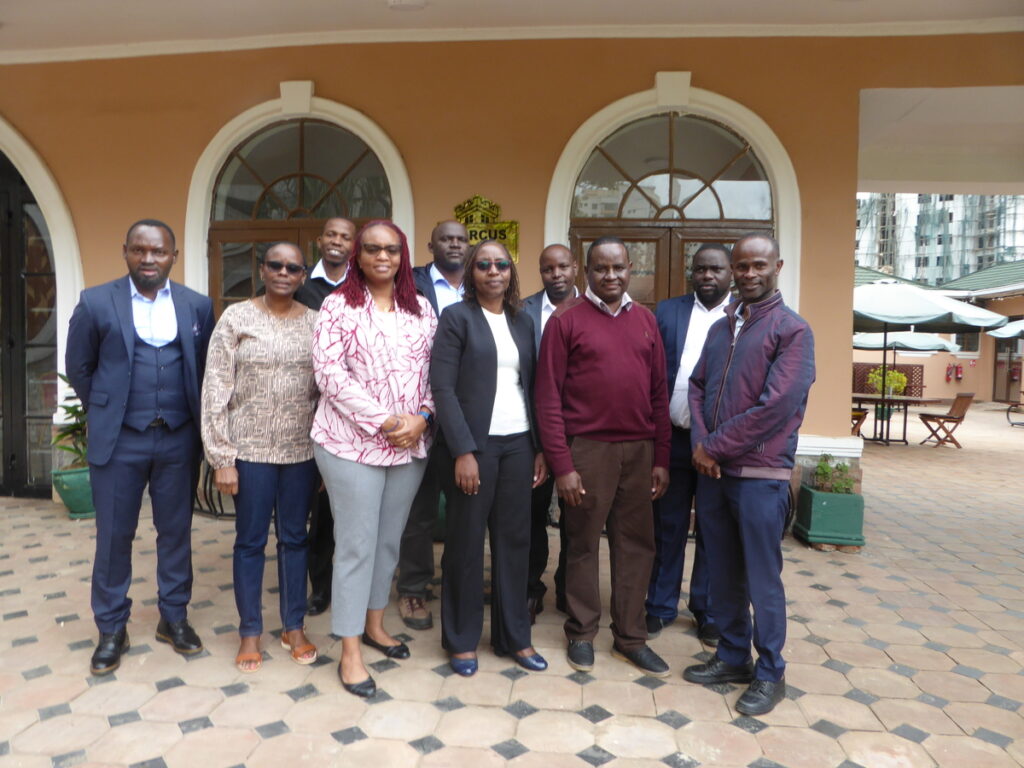Meet Dr. Allan Mweke, a national co-convener in Kenya for SIANI’s expert group on agrobiologicals. The aim of the group is to amplify the use and production of agrobiologicals (like biobased fertilisers and pest-control products) in East Africa, but Allan Mweke believes the approach could spread beyond the region.
SIANI’s East African Agrobiologicals expert group is coordinated by Stockholm Environment Institute (SEI) Africa and is active in Ethiopia, Kenya, and Tanzania. Each country has its own co-conveners, in Kenya, it is Professor Cecilia Onyango from the University of Nairobi and Dr. Allan Mweke from Mount Kenya University.
Allan Mweke specialises in biopesticide development and integrated pest management. He has taken a particular interest in agrobiologicals, which can be described as a diverse group of products derived from naturally occurring microorganisms, plant extracts, beneficial arthropods, or other organic matter. Typically, agrobiologicals are used to stimulate plant growth or to manage plant pests and diseases in a sustainable and environmentally friendly manner.
The SIANI expert group aims to bring together stakeholders across countries for a dialogue on agrobiologicals. Before the end of the project period, they also plan to push for policy changes to boost the production and use of agrobiologicals in East Africa.
What has the group in Kenya been doing so far?
In January of this year, we had a planning meeting held in Nairobi, gathering all East African working groups and representatives to develop plans for the project period. In June, representatives and stakeholders met in Nairobi for our first national dialogue, where we discussed topics such as production, regulations, usage of agrobiologicals, as well as what needs to be done in Kenya to advance agrobiologicals in the country. We have planned for another national dialogue meeting later in the year.
What are the roles of the different stakeholders?
The project includes multiple stakeholders from several sectors. From the private sector, manufacturers and retailers of agrobiologicals play a vital role as producers, distributors, and retailers. But as agrobiologicals are highly regulated, it’s also necessary to involve government agencies like the Pest Control Products Board (PCPB), Kenya Plant Health Inspectorate Service (KEPHIS) Agriculture and Food Authority (AFA) under the Ministry of Agriculture, which is responsible for monitoring, analysing, registering and licensing them. Researchers from universities and research organisations are responsible for conducting research and generating knowledge for the rest of the expert group.
Another vital stakeholder group is the farmers’ groups and organisations, who advocate for farmer’s welfare, market access, production, and manufacturing, among other aspects.
How will your work benefit smallholder farmers and communities?
In Kenya, there is an over-reliance on synthetic pesticides for pest and disease management. Replacing pesticides with agrobiologicals can benefit local farmers by providing an alternative that is less harmful to the users and the environment and that can help conserve biodiversity.
The use of agrobiologicals has formerly been confined only to large-scale farmers, although most of the food production, both for subsistence and export crops is being produced by small-scale farmers. We believe that by bringing small-scale farmers on board, they too will have the opportunity to embrace the benefits of using an organic pesticide, which can increase their productivity and market access, boosting their sources of livelihood. We hope to engage many different stakeholders, including manufacturers, researchers, and farmers.
What do you hope for the future?
We hope that in the future, authorities will continue what is initiated by the expert group, convening stakeholders to discuss when, where, and how to advance agrobiologicals.
The Kenyan working group will continue some of its work since it has received funding from the National Research Fund, Kenya (NRF) and the Swedish Research Council Formas. The new project will begin in November 2024 and provide training and extension services for farmers who want to use agrobiologicals.
Is this approach to agrobiologicals applicable in other countries as well?
Yes! We believe that, first and foremost, our work will be able to spill over beyond the Eastern African region to the entire Sub-Saharan Africa. As of now, we have another forum and team of researchers in South Africa that we are doing research together with on the subject. We hope that we can share our knowledge and lessons learned so that we can enhance the use of agrobiologicals.
How are agrobiologicals perceived in different countries?
As part of the AgriFoSe2030 project Professor Cecilia Onyango and I did a Knowledge, Attitude, and Practice (KAPS) survey on agrobiologicals in 2022. We compared Ethiopia, Kenya, and South Africa and could see that the level of interest is similar in the three countries, but the extent of research and regulation varies. For example, the concept of agrobiologicals is relatively new in Ethiopia, with about two companies that deliver them, while in Kenya, it is more established, with over 10 producers/dealers. Thus, you could say that Kenya has had a “head start” when it comes to the use of the products. The more producers and distributors there are, the more farmers can access the product.
What does it mean for you to be part of a SIANI expert group?
This is an exciting opportunity for me to serve as a co-convener and be part of a group advancing agrobiologicals. After over 10 years of research in this field, I’m thrilled to put my work into practice and help farmers adopt more sustainable inputs.
Being part of SIANI’s expert group brings us closer to making real change. While many universities and research organizations work on agrobiologicals, their findings often remain in publications. This platform allows us to reach key stakeholders and influence government policies to advance the agenda on agrobiologicals.
